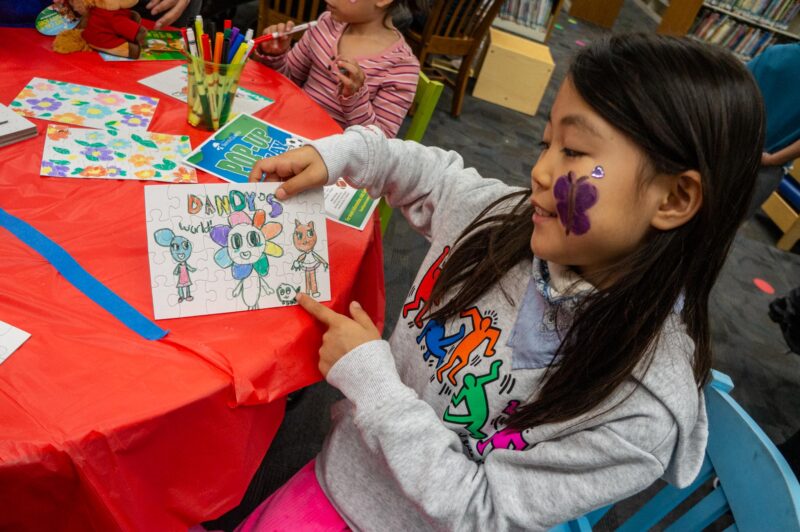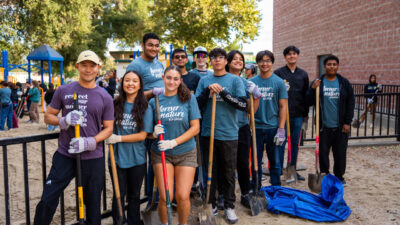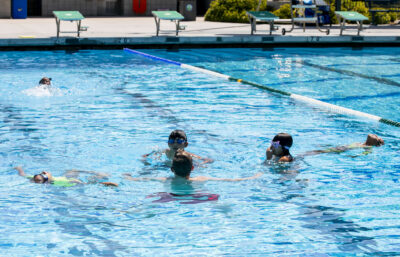As rain poured down on Saturday morning, children and families dashed for cover, many of them heading toward the Jo Anne Darcy Library.
After drying themselves off, many guests walked into the main entrance of the Canyon Country library branch and were met with large block letters that said, “LEER,” which means “Read” in Spanish.
From afar, one could hear children laughing, music playing, and a bit of chaos from different areas within the vicinity as there were arts and crafts stations, live reptiles to meet, performances, and games for people of all ages.
A large crowd gathered, clapping and cheering for an ensemble of folklorico performers made up of children, dancing to traditional Spanish-language music in the children’s library section.
Over 550 people were in attendance for the “Dia de los Niños/Dia de los Libros” event, an annual tradition at the local library meant to celebrate children, shed light to Hispanic culture, and promote reading.
“Día de los Niños/Día de los Libros,” or “Day of the Children/Day of the Books” in English, is celebrated nationwide across library branches, according to librarian Alyssa Holzschuh, and is inspired by Mexico’s Children’s Day, introduced in 1925.
The library hosts the celebration every year for its large Spanish-speaking demographic in the Canyon Country area, and to promote inclusivity.

“We really want to make the library a welcoming space for everybody, to celebrate the culture of our community, give space for the expression of culture, and history,” said Kendra Fitzpatrick, a senior librarian.
As families wandered off in search of their next activity after the dance performance, 7-year-old Ari Lee chose the puzzle-making station.
There, she was given a fully assembled blank puzzle along with art materials, and she let her imagination run wild, doodling characters and bringing them to life with colors of the rainbow.
Lee, who is Korean, was brought by her mother, Soojin, who said she wanted Ari to experience the diversity that exists in the world.
Soojin has been introduced to different foods and cultures by her best friend, who is Mexican and German, which has helped expand her understanding of different countries and their traditions.
So for her, it’s important to also start showing her daughter the many unique traditions each culture has so “she can appreciate and see how much effort each of us put into keeping the heritage alive,” she said, because, “it’s important, and it’s very important that we keep it growing” and showing other people “to appreciate.”

In the multipurpose room of the library, Gloria Arjona was preparing her materials that consisted of her guitar, a microphone, and “Loteria,” which is the Spanish-language version of Bingo and deeply rooted in tradition and played across all Hispanic countries, she said.
Arjona, who is an author and performer, has focused her research on the famous board game to learn its history, gain a better understanding in its traditional significance within the Hispanic community, and to help the new generation of children find alternative ways of fun away from a screen that will nurture community, she said.
“It creates community, and to be with family, to socialize,” she said. “It’s a way to connect with our traditions, our roots, and with our family. It’s a very inclusive game because everybody can play.”
As families settled down to participate in the board game activity, 5-year-old Gianna Martinez came in with her mom, Giovanna Martinez, and shared a “Loteria” game card with another young child and adult.

Giovanna, who comes from a Guatemalan background, was looking for a fun activity to participate in with her daughter, which led her to the children’s celebration.
“I never experienced Dia de los Niños,” Giovanna said, “so I’m very excited to now start a new tradition with my daughter. It’s pretty cool to celebrate kids, and how everyone is coming together to celebrate.”
For the mother and daughter duo, it was the first time they spent a Saturday together due to Giovanna’s work schedule, she said, and “we’re excited to spend more quality time.”
As Gianna participated in numerous activities throughout the day, her mother only hopes she continues to learn about her culture, embrace who she is and, as Giovanna said, to “just be herself.”










